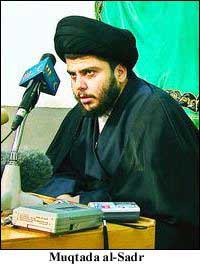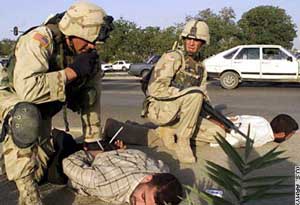|
 The
Army's powerful 1st Armored Division is proclaiming victory
over Sheik Muqtada al-Sadr's marauding militia that just
a month ago seemed on the verge of conquering southern
Iraq. The
Army's powerful 1st Armored Division is proclaiming victory
over Sheik Muqtada al-Sadr's marauding militia that just
a month ago seemed on the verge of conquering southern
Iraq.
The Germany-based division defeated the
militia with a mix of American firepower and money paid
to informants. Officers today say "Operation Iron
Saber" will go down in military history books as
one of the most important battles in post-Saddam Hussein
Iraq.
"I've got to think this was a watershed
operation in terms of how to do things as part of a counterinsurgency,"
said Brig. Gen. Mark Hertling, a West Point graduate and
one of two 1st Armored assistant division commanders,
in an interview last week as he moved around southern
Iraq. "We happened to design a campaign that did
very well against this militia."
 When
the division got word April 8 that Sheik al-Sadr's uprising
meant most 1st Armored soldiers would stay and fight,
rather than going home as scheduled, it touched off a
series of remarkable military maneuvers. When
the division got word April 8 that Sheik al-Sadr's uprising
meant most 1st Armored soldiers would stay and fight,
rather than going home as scheduled, it touched off a
series of remarkable military maneuvers.
Soldiers, tanks and helicopters at a port
in Kuwait reversed course, rushing back inside Iraq to
battle the Shi'ite cleric's 10,000-strong army. Within
days, a four-tank squadron was rumbling toward the eastern
city of Kut. And within hours of arriving, Lt. Col. Mark
Calvert and his squadron had cleared the town's government
buildings of the sheik's so-called Mahdi's Army.
Meanwhile, Maj. Gen. Martin E. Dempsey,
1st Armored commander, huddled with Gen. Hertling and
other senior aides to map an overall war strategy. The
division would shift from urban combat in Baghdad's streets
to precision strikes amid shrines of great religious significance.
Hunting the enemy in tight city streets
broadened to patrolling a region the size of Vermont.
 Gen.
Dempsey first needed the locations of Sheik al-Sadr's
rifle-toting henchmen. Average Iraqis, fed up with the
militia's kidnappings and thievery, quickly became spies,
as did a few moderate clerics who publicly stayed neutral. Gen.
Dempsey first needed the locations of Sheik al-Sadr's
rifle-toting henchmen. Average Iraqis, fed up with the
militia's kidnappings and thievery, quickly became spies,
as did a few moderate clerics who publicly stayed neutral.
Once he had targets, Gen. Dempsey could
then map a battle plan for entering four key cities --
Karbala, Najaf, Kufa and Diwaniyah. This would be a counterinsurgency
fought with 70-ton M-1 Abrams tanks and aerial gunships
overhead. It would not be the lightning movements of clandestine
commandos, but rather all the brute force the Army could
muster, directed at narrowly defined targets.
Last week, Sheik al-Sadr surrendered.
He called on what was left of his men to cease operations
and said he may one day seek public office in a democratic
Iraq.
Gen. Hertling said Mahdi's Army is defeated,
according to the Army's doctrinal definition of defeat.
A few stragglers might be able to fire a rocket-propelled
grenade, he said, but noted: "Do they have the capability
of launching any kind of offensive operation? Absolutely
not."
The division estimates it killed at least
several thousand militia members.
Gen. Dempsey designed "Iron Saber"
based on four pillars: massive combat power; information
operations to discredit Sheik al-Sadr; rebuilding the
Iraqi security forces that fled; and beginning civil affairs
operations as quickly as possible, including paying Iraqis
to repair damaged public buildings.
"As soon as we finished military
operations, we immediately began civil-military operations,"
said Gen. Hertling. "We crossed over from bullets
to money."
The strike into Kut was followed by an
incursion into Diwaniyah. Then an 18-tank battalion entered
Karbala, a holy city where precision operations were needed
to spare religious shrines. Then soldiers moved into Najaf
and Kufa, where Sheik al-Sadr was hiding out and where
about 3,000 of his fighters occupied government buildings,
mosques, amusement parks and schools.
"We were going from outside in to
get this guy," Gen. Hertling said. "We had to
go after them one city at a time."
|